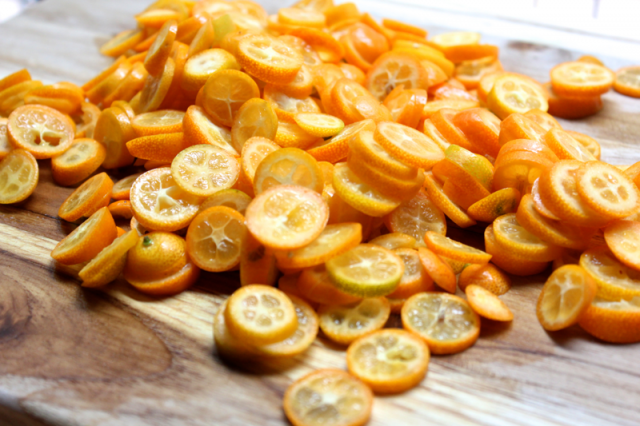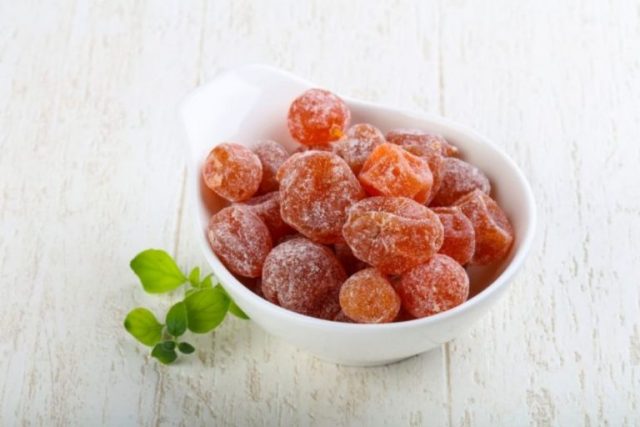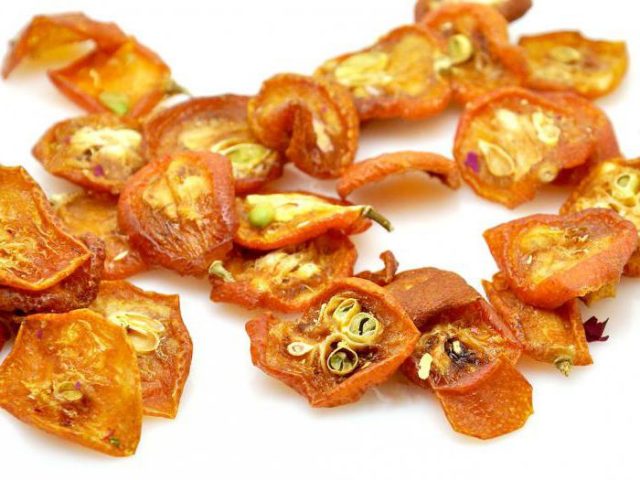Content
Dried kumquat is an exotic dried fruit that few people know about its properties. Meanwhile, it is interesting to figure out what health benefits the product brings, and how to use it correctly.
What is this dried kumquat fruit?
An unusual fruit called kumquat is native to China, Japan, the Middle East and South America. The plant belongs to citrus fruits, outwardly it is an evergreen tree with a rounded crown. Kumquat blooms with beautiful white flowers and bears small orange fruits - only about 3 cm in diameter.
Kumquat fruits are a bit like oranges, although they are much smaller in size and have an elongated shape. The taste of kumquat resembles a sour tangerine, and you can eat not only the pulp of the fruit, but also their peel - sweetish with a slight bitterness.
Kumquat is found in stores not only fresh, but also dried. Dried kumquat is a common fruit that has been dried to near evaporation of moisture, but has significant health benefits.
Types of dried kumquat
Dried kumquat comes in several varieties in stores. First of all, the product is different in color. There are the following variations:
- yellow - this color can be found most often, it is the most natural for kumquat, dried in a natural way;
- Orange, this variety is also common, dried fruits retain their natural color;
- red - a real red dried kumquat may have a pale shade, however, a rich bright color may indicate the presence of dyes;
- green - most often the shade indicates a touch-up, however, dried green kumquat can also be a hybrid of kumquat and lime, which does have a grassy color.
In addition to the usual dried kumquat, there are also dried fruits - fruits dried together with the whole peel. You can also find candied fruits in stores - they differ from dried kumquat and dried fruits in that they are first boiled in sugar syrup before drying. At the same time, the benefits of the product remain quite high.
Why are dried kumquats of different colors
Dried fruit wedges are found mainly in 4 shades - yellow, red, green and orange.
Yellow and orange colors are completely natural for the product, but red and green shades most often indicate the use of food colors. Sometimes the color green or red is explained by the fact that the manufacturer does not offer a "pure" kumquat, but one of the many hybrid varieties.
Composition and nutritional value of dried kumquat
Dried yellow kumquat is as healthy as fresh citrus fruit, if not more so. The fact is that when dried, almost all useful substances are preserved in the slices, and the concentration of some of them even increases. The product includes:
- vitamins C, E and B;
- manganese, zinc, copper and selenium;
- iron and calcium;
- pectins and fiber;
- essential oils - limonene, pinene, caryophyllene and many others;
- tannins;
- antioxidants;
- beta carotene.
From the point of view of nutritional value, the product consists mainly of carbohydrates, there are about 80 g of them in dried slices. Proteins occupy about 3.8 g in total, and fats are completely absent.
Calorie content of dried kumquat
The calorie content of dried kumquat per 100 g is about 283 kcal. Thus, dried slices are much more nutritious than fresh ones.
Calorie content of candied fruits from kumquat
Candied fruits have an even higher nutritional value. 100 g of a sweet treat contains about 300 kcal.
Benefits of Dried Kumquat
If we consider the composition of the product, it becomes clear that the useful properties and contraindications of dried kumquat are very diverse. The product is appreciated not only for its taste - with regular use, it can bring the following benefits:
- normalize digestive processes due to the high fiber content;
- to help with spasms and increased gas production;
- cleanse the intestines, kumquat removes accumulated toxins and toxic substances from the body;
- improve blood composition and liver health;
- increase the body's immune resistance and strengthen the vascular walls;
- have a beneficial effect on heart activity, dried fruit protects against strokes and heart attacks;
- lower cholesterol and prevent the development of cancerous tumors;
- eliminate the symptoms of anemia and vitamin deficiency.
The benefits of kumquat are its beneficial effects on bone tissue and the nervous system. The product improves brain activity and helps to strengthen memory, the beneficial properties of dried yellow kumquat have a rejuvenating effect on the body.
How to dry a kumquat at home
The easiest way to get natural little lemons and dried kumquat fruit is to dry the citrus fruit slices yourself. This will preserve their useful composition and avoid the use of artificially colored fruits.
At home, 3 methods of drying the product are used.
- In an electric dryer. Fresh fruits must be washed thoroughly, then cut in half, and then cut into thin slices each of the halves. You don't need to peel off the kumquat. Cut slices with small intervals are laid out on the grill of the device, the temperature is set to 135 ° C and the dryer is turned on for 6 hours.
- In the oven. In the absence of a special device, you can dry the slices in a conventional oven. It is heated to 100-120 ° C, and the sliced kumquat is laid out on a lattice covered with parchment paper. You need to keep the blanks in the oven for about 5-8 hours, periodically checking the readiness. If possible, leave the oven door slightly ajar for better air circulation so that the wedges do not get too brittle. It is not recommended to spread the kumquat on a regular baking sheet, in this case the drying process will be uneven for different sides.
- In a natural way. It is most difficult to prepare a delicacy by natural air drying, the problem is that in conditions of high humidity, kumquat more often rots than dries out. Basically, fans of "air" drying use 2 methods - thin slices of fruit are either hung on a string in the kitchen, or laid out on a thin pallet on a central heating battery.
How to make candied kumquat at home
The beneficial properties of dried yellow kumquat are preserved in candied fruits.You can also cook a sweet product in your own kitchen yourself, it will take a lot of time for this, but the result will be very tasty.
Cooking candied fruits is as follows:
- a small amount of kumquat fruits are washed properly, cut into slices and the seeds are removed;
- 500 g of granulated sugar is poured into 250 ml of water and boiled for several minutes until a thick syrup is obtained;
- Pour the prepared fruit slices into the boiling mixture, reduce the heat to medium and cook for another 10 minutes;
- remove from the stove and allow the candied fruits to cool completely naturally.
The main nuance of the preparation is that the next day the procedure will need to be repeated and the candied fruit must be boiled in syrup again for 10 minutes. The same should be done within the next 2 days.
After that, the almost finished delicacy is laid out on a baking sheet covered with parchment, and left in a well-ventilated place for a day. When the candied fruits are dry, they will need to be put in the oven for 5-6 hours, preheated to a low temperature - no more than 50 ° C. At the last stage of cooking, sweet slices are sprinkled with powdered sugar and consumed with taste and benefit.
How to eat dried kumquat
The benefits and harms of dried kumquat fruits depend on the literacy of their use. First of all, you need to remember about the increased calorie content of dried kumquat fruits and not exceed the recommended daily dosages. It will be enough to eat only 6-8 fruits per day, if this rate is exceeded, the nutritional properties of the product can negatively affect digestion and the figure.
You can eat dried kumquat as a separate delicacy, but often it is combined with other foods and drinks - the benefits are not diminished. For example, you can add dried wedges to alcoholic and non-alcoholic cocktails for exotic aroma and taste.
Dried wedges can be put into tea or ground into a powder and mixed with tea leaves. It benefits and pleases with a pleasant taste of kumquat combined with honey - the product can be dipped in honey or molasses and consumed with tea or coffee.
How to store dried kumquat
The benefits and harms of dried kumquat are largely determined by its freshness - it is not recommended to eat an expired or spoiled delicacy.
- It is necessary to store dried slices in a clean and dry container, away from sunlight and at low temperatures.
- It is best to put the food in a glass jar or plastic container and refrigerate it on the vegetable shelf.
- It is important to ensure that the humidity in the storage area is as low as possible, dried slices lose their benefits from contact with moisture and deteriorate faster.
Subject to all conditions, the delicacy can retain its valuable properties and benefits up to a year.
As for candied fruits, the best place to store them would be a jar of sweet syrup, in such conditions they can retain their benefits for up to 3 years. But in this case, the candied fruit will need to be constantly dried before use, which is not always convenient. Therefore, they are much more often stored in a dry container in a refrigerator at a temperature not exceeding 15 ° C. When storing candied fruits, it is also important to ensure that the air humidity does not exceed 60%, and the direct rays of the sun do not fall on the container with the product.
In the refrigerator, candied fruits can stay fresh and benefit up to six months.
Conclusion
Dried kumquat is not only tasty, but also a very healthy exotic delicacy, which can be prepared at home. With reasonable dosages, dried fruit can have a beneficial effect on the body and bring health benefits, the main thing is not to exceed the daily intake and give preference to only a natural product.












